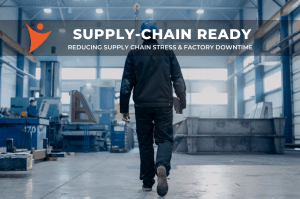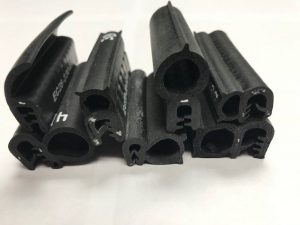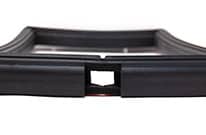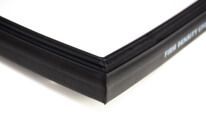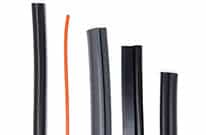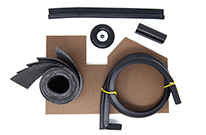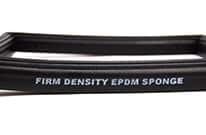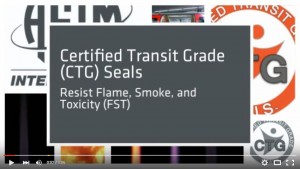
Elasto Proxy custom-fabricates EPDM gaskets made of certified transit grade (CTG) rubber that resists flame, smoke, and toxicity (FST). Technical buyers and design engineers who source custom-fabricated CTG seals can meet mass transit industry requirements and precise project specifications.
Mass transit systems need to operate efficiently while ensuring passenger safety and controlling costs. Bus accidents, train derailments, and subway delays capture the headlines, but the mass transit industry must manage other risks, too. Fires within a cabin, vehicle, or passenger car can do more than burn seats, wall panels, and other interior components. Smoke from combustion reactions can obscure escape routes. Burning materials that release toxic gases can also overwhelm passengers and employees, too.
Certified Transit Grade (CTG) Sealing Solutions
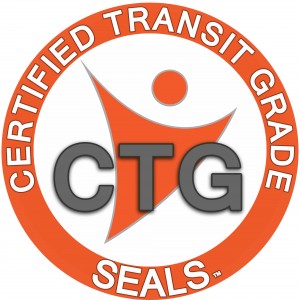
Manufacturers that serve the mass transit industry need to select materials that meet published standards for flame, smoke, and toxicity (FST). Elasto Proxy, a custom fabricator of industrial rubber products, understands these fire safety requirements and voluntary industry specifications. That’s why we’re introducing Certified Transit Grade (CTG) solutions for bus, subway, and rail manufacturers. The CTG seals and gaskets that we can custom-fabricate include bulb trim made from a special EPDM rubber.
Developed in partnership with a long-term, trusted supplier, this elastomer has been tested and certified by an independent laboratory. Elasto Proxy supplied samples or specimens, and the laboratory conducted the following tests according to published standards from ASTM International and Bombardier, Inc.
- ASTM E162
- ASTM E662
- ASTM E1354
- SMP 800-C
Let’s examine the test results and consider how custom-fabricated CTG seals add value to your operations.
ASTM E162 for Surface Flammability
Published by ASTM International, ASTM E162 is a test that uses a radiant heat energy source to measure surface flammability. First, a specimen is pre-dried for 24 hours at 60° C and conditioned to equilibrium at 23° C with 50% relative humidity. Next, the specimen is exposed to a flame for 900 seconds while measurements such as average radiant panel index and flame spread factor are recorded. Elasto Proxy’s 152-mm x 457-mm specimen did not exhibit flashing, and was not completely destroyed.
ASTM E662 for Optical Density of Smoke
ASTM E662 measures the specific optical density of smoke generated by solid materials. First, a specimen is pre-dried for 24 hours at 60° C and conditioned to equilibrium at 23° C with 50% relative humidity. Next, the specimen is exposed to a flame for 1200 seconds. The optical density of smoke from the combustion reaction is then measured at intervals of 1.5 minutes and 4 minutes. Elasto Proxy’s specimen passed this test, and did not exhibit delamination, sagging, shrinkage, melting, collapse, peeling, or swelling.
ASTM E1354 for Heat and Visible Smoke
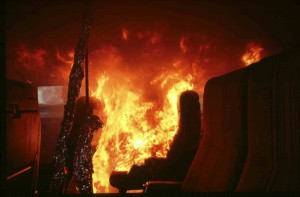
ASTM E1354 uses an oxygen consumption calorimeter to measure release rates for heat and visible smoke from three specimens. This horizontal test uses a spark igniter, and reports results such as changes in thickness and mass, heat release rate, and smoke obscuration. Each of Elasto Proxy’s specimens passed this test, which is used to determine the ignitability, effective heat of combustion, and visible smoke development of materials.
SMP 800-C for Toxic Gas Generation
SMP 800-C from Bombardier measures toxic gas generation from material combustion at specific time intervals. Carbon monoxide (CO) and carbon dioxide (CO2) are measured with a gas purity analyzer. Six other gases are trapped in a sodium hydroxide solution and analyzed with either an ionic chromatograph or ionic selective electrode. These toxic gases are hydrogen fluoride (HF), hydrogen chloride (HCl), hydrogen cyanide (HCN), nitrogen oxides (NOx), and sulfur dioxide (SO2), and hydrogen bromide (HBr).
How Custom Fabricated CTG Seals Add Value
Custom-fabricated CTG seals add value to your operations by meeting the specific needs of the mass transit industry. Yet these sealing solutions do more than meet flame, smoke, and toxicity (FST) standards. Because they’re custom-fabricated by Elasto Proxy, CTG seals can also meet your project specifications for part sizes and dimensional tolerances. Are you ready to learn more? Please contact Elasto Proxy about CTG seals and one of our solutions providers will contact you.

 Clyde Sharpe
Clyde Sharpe
General Manager at Elasto Proxy

